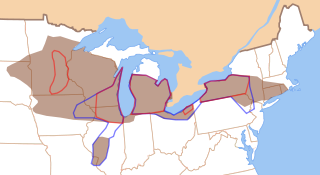Related Research Articles

American English (AmE), sometimes called United States English or U.S. English, is the set of varieties of the English language native to the United States. English is the most widely spoken language in the United States; the de facto common language used in government, education and commerce; and an official language of most U.S. states. Since the late 20th century, American English has become the most influential form of English worldwide.
Hiberno-English or Irish English (IrE), also formerly sometimes called Anglo-Irish, is the set of dialects of English native to the island of Ireland. In both the Republic of Ireland and Northern Ireland, English is the dominant first language in everyday use and one of two official languages, along with the Irish language.
Spoken English shows great variation across regions where it is the predominant language. The United Kingdom has a wide variety of accents, and no single "British accent" exists. This article provides an overview of the numerous identifiable variations in pronunciation. Such distinctions usually derive from the phonetic inventory of local dialects, as well as from broader differences in the Standard English of different primary-speaking populations.

Canadian raising is an allophonic rule of phonology in many varieties of North American English that changes the pronunciation of diphthongs with open-vowel starting points. Most commonly, the shift affects or, or both, when they are pronounced before voiceless consonants. In North American English, and usually begin in an open vowel [~], but through raising they shift to, or. Canadian English often has raising in words with both and, while a number of American English varieties have this feature in but not. It is thought to have originated in Canada in the late 19th century.
General American English, known in linguistics simply as General American, is the umbrella accent of American English spoken by a majority of Americans, encompassing a continuum rather than a single unified accent. It is often perceived by Americans themselves as lacking any distinctly regional, ethnic, or socioeconomic characteristics, though Americans with high education, or from the North Midland, Western New England, and Western regions of the country are the most likely to be perceived as using General American speech. The precise definition and usefulness of the term continue to be debated, and the scholars who use it today admittedly do so as a convenient basis for comparison rather than for exactness. Other scholars prefer the term Standard American English.

Scouse, more formally known as Liverpool English or Merseyside English, is an accent and dialect of English associated with the city of Liverpool and the surrounding Liverpool City Region. The Scouse accent is highly distinctive as it was influenced heavily by Irish and Welsh immigrants who arrived via the Liverpool docks, as well as Scandinavian sailors who also used the docks, and thus has very little in common with the accents found throughout the rest of England. People from Liverpool are known as Liverpudlians, but are usually called Scousers; the name comes from scouse, a stew originating from Scandinavian lobscouse eaten by sailors and locals.

Ulster English, also called Northern Hiberno-English or Northern Irish English, is the variety of English spoken mostly around the Irish province of Ulster and throughout Northern Ireland. The dialect has been influenced by the local Ulster dialect of the Scots language, brought over by Scottish settlers during the Plantation of Ulster and subsequent settlements throughout the 17th and 18th centuries. It also coexists alongside the Ulster dialect of the Irish (Gaelic) language.

The spoken English language in Northern England has been shaped by the region's history of settlement and migration, and today encompasses a group of related accents and dialects known as Northern England English (or, simply, Northern (English) in the United Kingdom).
North American English regional phonology is the study of variations in the pronunciation of spoken North American English —what are commonly known simply as "regional accents". Though studies of regional dialects can be based on multiple characteristics, often including characteristics that are phonemic, phonetic, lexical (vocabulary-based), and syntactic (grammar-based), this article focuses only on the former two items. North American English includes American English, which has several highly developed and distinct regional varieties, along with the closely related Canadian English, which is more homogeneous geographically. American English and Canadian English have more in common with each other than with varieties of English outside North America.
Australian English is relatively homogeneous when compared with British and American English. The major varieties of Australian English are sociocultural rather than regional. They are divided into 3 main categories: general, broad and cultivated.
Indian English has developed a number of dialects, distinct from the General/Standard Indian English that educators have attempted to establish and institutionalise, and it is possible to distinguish a person's sociolinguistic background from the dialect that they employ. These dialects are influenced by the different languages that different sections of the country also speak, side by side with English. The dialects can differ markedly in their phonology, to the point that two speakers using two different dialects can find each other's accents mutually unintelligible.
Dublin English is the collection of diverse varieties of Hiberno-English spoken in the metropolitan area of Dublin, the capital of the Republic of Ireland. Modern-day Dublin English largely lies on a phonological continuum between two extremes.
The English language spoken and written in England encompasses a diverse range of accents and dialects. The language forms part of the broader British English, along with other varieties in the United Kingdom. Terms used to refer to the English language spoken and written in England include English English and Anglo-English.

Northern American English or Northern U.S. English is a class of historically related American English dialects, spoken by predominantly white Americans, in much of the Great Lakes region and some of the Northeast region within the United States. The North as a superdialect region is best documented by the 2006 Atlas of North American English (ANAE) in the greater metropolitan areas of Connecticut, Western Massachusetts, Western and Central New York, Northwestern New Jersey, Northeastern Pennsylvania, Northern Ohio, Northern Indiana, Northern Illinois, Northeastern Nebraska, and Eastern South Dakota, plus among certain demographics or areas within Michigan, Wisconsin, Minnesota, Vermont, and New York's Hudson Valley. The ANAE describes that the North, at its core, consists of the Inland Northern dialect and Southwestern New England dialect.

Manchester dialect or Manchester English, known informally as Mancunian or Manc, is the English accent and dialect variations native to Manchester and some of the Greater Manchester area of England. Sharing features with both Northern and West Midlands English, it is closely related to its neighbours like the Lancashire dialect and the West Riding dialect of Yorkshire.
The distinction between rhoticity and non-rhoticity is one of the most prominent ways in which varieties of the English language are classified. In rhotic accents, the sound of the historical English rhotic consonant,, is preserved in all pronunciation contexts. In non-rhotic accents, speakers no longer pronounce in postvocalic environments: when it is immediately after a vowel and not followed by another vowel. For example, in isolation, a rhotic English speaker pronounces the words hard and butter as /ˈhɑːrd/ and /ˈbʌtər/, but a non-rhotic speaker "drops" or "deletes" the sound and pronounces them as /ˈhɑːd/ and /ˈbʌtə/. When an r is at the end of a word but the next word begins with a vowel, as in the phrase "better apples," most non-rhotic speakers will preserve the in that position since it is followed by a vowel in this case.
Raymond Kevin Hickey is an Irish linguist specialising in the English language in Ireland, especially in the capital Dublin, working within the sociolinguistic paradigm of language variation and change. Hickey has also worked on the Irish language, specifically the phonology of the modern language. For both Irish and English in Ireland he has carried out extensive fieldwork for over three decades.

South-West Irish English is a class of broad varieties of English spoken in Ireland's South-West Region. Within Ireland, the varieties are best associated with either the urban working class of the South-West or traditional rural Ireland in general, and they are popularly identified by their specific city or county, such as Cork English, Kerry English, or Limerick English.
Zimbabwean English is a regional variety of English found in Zimbabwe. While the majority of Zimbabweans speak Shona (75%) and Ndebele (18%) as a first language, standard English is the primary language used in education, government, commerce and media in Zimbabwe, giving it an important role in society. Just under 5 percent of Zimbabweans are native English speakers and 89 percent of the population can speak English fluently or at a high level, second only to the Seychelles amongst African nations.
References
- ↑ "Broad." Def. 5. Oxford Dictionaries. © 2015 Oxford University Press.
- ↑ Keane, Peter. "Tyke: It's all the Vikings' fault (sort of)". BBC Bradford and West Yorkshire. BBC. Retrieved 16 April 2008.
- ↑ Hickey, Raymond. A Sound Atlas of Irish English , Volume 1. Walter de Gruyter: 2004.